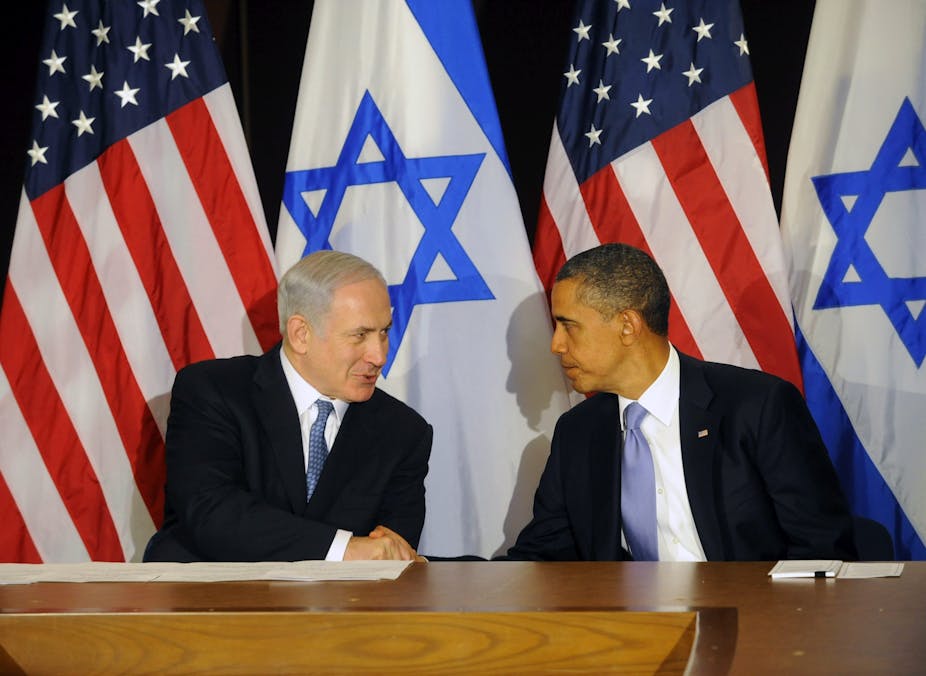At the same dinner party that Mitt Romney infamously told his $50,000-a-plate supporters that 47% of the American public are slackers, he also delved into foreign policy.
Romney told his audience that peace in Israel/Palestine is “just wishful thinking”.
I always keep open the idea of, I have to tell ya, the idea of pushing on the Israelis? - to give something up, to get the Palestinians to act, is the worst idea in the world. We have done that time and time and time again. It does not work. So, the only answer is show your strength. Again, American strength, American resolve.
This insight gives us some clue to Romney’s approach to Israel: use American strength, or the perception of American strength, to support Israel in its aims. At the same time, don’t do anything to help push peace forward: and so Palestinians remain stuck, with a well-funded Israeli army sitting on top of them. This is not surprising. As Guardian journalist Gary Younge has written, the Republicans are the party of white America. It is not too far of a stretch to see that they are will support similar elements in Israel who preach a particular form of supremacy.
But how different is Barack Obama’s position?
On his campaign website, the section that outlines his policy on Israel is called “America & Israel: An Unbreakable Bond”. Obama claims that “America’s commitment and my commitment to Israel and Israel’s security is unshakeable”. He emphasises a commitment to Israel’s “security”, and doesn’t mention Palestinians here once. As was recently written in an op-ed in the New York Times:
There’s no denying that by every tangible measure, [Obama’s] support for Israel’s security and well-being has been rock solid… Mr. Obama has assured Mr. Netanyahu that he will “always have Israel’s back”.
So where does the local American support of Israel fit into this? What role does it play?
The existence of a powerful domestic Israel lobby, led by the American Israel Public Affairs Committee, is no small thing. But we also need to remember that there is significant general domestic electoral support for America providing Israel with abundant military support. America’s economy is in dire straits, both campaigns are talking about how to attempt to balance the budget, and, as political commentator M.J. Rosenberg has pointed out, no one is talking about cutting funding to Israel.
Rosenberg recently wrote that:
The current economic situation has put all…programs under scrutiny, and most have sustained cuts which have cost many Americans (including cops and teachers) their jobs. The one program exempt from scrutiny and from cuts is the aid to Israel program. In fact, every budget slashing proposal passed or pending in Congress exempts Israel and only Israel (no, the U.S. military is not exempt while the Israeli military is).
Even J Street, the ostensibly liberal arm of the “pro-Israel” camp, supports this position. Rachel Lerner, the Vice President of the J Street Educational Fund, recently wrote that “J Street opposes proposals to condition or cut security assistance to Israel”.
It is only because of this seeming national consensus - which of course isn’t a real consensus, as there are plenty of dissenters to the positions of the two major parties and their presidential campaigns - that this absurd state of affairs can continue.
We saw this consensus laid out clearly in the vice presidential debate between Joe Biden and Paul Ryan on October 12. There we saw both candidates tripping over themselves to make a claim to being the best friend that Israeli Prime Minister Benjamin Netanyahu has. When challenged by Ryan on the closeness of the Democrats and Netanyahu, Biden vigorously asserted that he has been friends with Netanyahu for 39 years.

Considering that Netanyahu has just called an election, it begs the question of how much the next US President will be getting involved in that election campaign. And it reminds us all that it would seem that no matter what an Israeli government does to Palestinians, to refugees who are turned away or locked up, and to increase social and economic stratification (as highlighted by last year’s J14 tent protests), whoever wins the election will maintain this close friendship and support.
And so while Peter Beinart, amongst others, might argue that Netanyahu is a friend of the GOP whereas Defence Minister Ehud Barak is friends with the Democrats, it seems as though both parties are going out of their way to demonstrate that they are good friends with whoever is in charge. American commentator Glenn Greenwald wrote of this attitude that:
On still other vital issues, such as America’s steadfastly loyal support for Israel and its belligerence towards Iran, the two candidates will do little other than compete over who is most aggressively embracing the same absolutist position.
The challenge then becomes how to break this absolutist position and the ideas of intervention and control in the Middle East that it goes with. Because it is clear that from the perspective of the vast majority of Palestinians, a win for either candidate is a massive loss.

